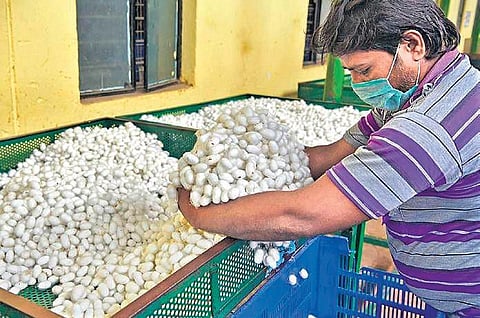

VIJAYAWADA: The silk farmers of Anantapur, who were affected because of the summer heat last year and declining prices of cocoons, have suffered more losses due to Covid-19 crisis this year as there was no market for the last seven months. Now, with markets reopening one by one and increasing demand for a ban on Chinese silk, the silk farmers hope for a better future.
Since sericulture was introduced in the State several decades ago, Anantapur farmers have been in the forefront of cultivating mulberry and producing cocoons. Despite the declining prices of cocoons in the market for the past few years in view of the dominance of Chinese silk, sericulturists in the district were not that discouraged, but with silence in the market in the last seven months, several farmers temporarily gave up on sericulture.
According to Anantapur sericulture department joint director D Padma, anywhere between 10,000 to 12,000 acres under sericulture (mulberry cultivation) was lost, with 3,000 to 4,000 farmers shifting to other crops. “It could be temporary and we expect them to take up mulberry cultivation once again, when normalcy is restored,” she said.
Reason for the trend is the cascading effect of the closure of markets for a long duration. Due to the lockdown, the textile and handloom market was hit. No transactions and no sales happened for several months, resulting in stockpiling of the finished products with companies and master weavers. As a result, the silk yarn production was hit, resulting in no demand for the fresh cocoons.
Further, availability of workers has become a problem in view of Covid-19 restrictions. “As we are not having sales of the cocoon, payment of wage, Rs 300 to Rs 500 per day per worker, has become a burden and at the end of the day, we are suffering losses,” said Aswarthappa, a silk farmer from Sadlapalle in Lepakshi mandal. He says if the market situation is good, it is beneficial. For the past few years, the market is not that good.
Unlike before, silk farmers are being provided with silkworms from Chawki Rearing Centres, where the young silkworms are bread in a controlled climate. “Since the last one year, cost of production and income are not balancing. If it continues, I may go for other crops. I hope the situation will get better,” said Manjunath, another silk farmer from Lepakshi mandal. Silk farmers in the State hope for a mechanism in place for MSP (like in agricultural crops), steady market and procurement by the government in case of volatile market condition.
Sericulture
42,000 acres: Areas of sericulture in Anantapur district
50 per cent of the cocoon production in the State is from Ananatapur and Chittoor district
10,000 acres to 12,000 acres under sericulture (mulberry cultivation) was lost, with 3,000 to 4,000 farmers shifting to other crops
How they faced loss
Markets remain closed for a long duration
Due to lockdown, the textile and handloom market was hit
No transactions and no sales happened for several months, resulting in stockpiling of the finished products with companies and master weavers
As a result, the silk yarn production was hit, leading to no demand for the fresh cocoons